| 1 |
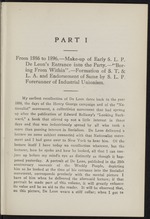 |
“...PART I
From 1886 to 1896.Make-up of Early S. L. P.
De Leons Entrance into the Party.Bor-
ing From Within.Formation of S. T. &
L. A. and Endorsement of Same by S. L. P.
Forerunner of Industrial Unionism.
My earliest recollection of De Deon dates back to the year
1886, the days of the Henry George campaign and of the Na-
tionalist movement, a collectivist movement that had sprung
up after the publication of Edward Bellamys Looking Back-
ward, a book that stirred up not a little interest in those
days and that was industriously spread by all who took a
more than passing interest in Socialism. De Leon delivered a
lecture on some subject connected with that Nationalist move-
ment and I had gone over to New York to hear him. Of the
lecture itself I have today no recollection whatever, but the
lecturer, how he spoke and how he looked, all that I can con-
jure up before my minds eye as distinctly as though it hap-
pened yesterday. A portrait of De Leon, published in the 2Sth
anniversary souvenir...”
|
|
| 2 |
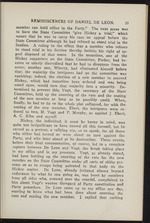 |
“...do so the whole plot collapsed, for with the
seating of the new member, Ebert, the intriguers were re-
duced to two, H. Vogt and P. Murphy, as against J. Ebert.
A, C. Kihn and myself.
^ Hickey, the individual, it must be borne in mind, was
quite too insignificant to have caused all this turmoil, but he
served as a pretext, a rallying cry, so to speak, for all those
who either had turned or were about to turri against the
Party, and who later aimed at its destruction. These events,
before their final consummation, of course, led to a complete
rupture between De Leon and Vogt, the break taking place
in my office and in my presence. Vogt, as already stated,
had been holding up the counting of the vote for the new
member on the State Committee under all sorts of shifty pre-
texts so as to escape being outvoted in that body on the
Hickey matter. De Leon, already irritated almost beyond
endurance by what he saw going on, was beset by members
from all sides who, aroused over the scandal, complained...”
|
|
| 3 |
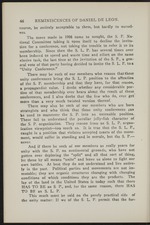 |
“...66 REMINISCENCES OF DANIEL DE LEON.
course, be entirely acceptable to them, but hardly to oursel-
yes.
The move made in 1908 came to naught, the S. P. Na-
tional Committee taking it upon itself to decline the invita-
tion for a conference, not taking the trouble to refer it to its
membership. Since then the S. L. P. has several times over
been induced to spend and wa.ste time and effort on the same
elusive task, the last time at the invitation of the S. P., a gen-
eral vote of that party having decided to invite the S. L. P. toa
Unity Conference."
There may be such of our members who reason that these
unity conferences bring the S. L. P. position to the attention
of the S. P. membership and that they have, for that reason,
a propagandist value. I doubt whether any considerable por-
tion of that membership ever hears about the result of these
conferences, and I also doubt that the few who do, ever get
more than a very much twisted version thereof.
There may also be such of our members who...”
|
|
| 4 |
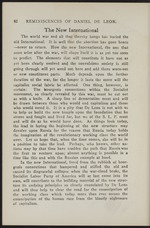 |
“...that De Leon is not with us
to help us build the new temple upon the foundation that he
strove and fought and lived for, but we of the S. L. P. must
and will do as he would have done. As things look today,
the lead in laying the beginning of the new structure may
devolve upon Russia for the reason that Russia today holds
the imagination of the revolutionary working class the world
over. Let us hope that, when the time comes, she will be in
a position to take the lead. Perhaps, who knows, other na-
tions may by that time have trodden the path that Russia was
the first to venture upon; almost anything is possible in a
time like this and with the Russian example at hand.
In the new International, freed from the rubbish of bour-
geois connections that hampered and stifled the old and
caused its disgraceful collapse when the war-cloud broke, the
Socialist Labor Party of America will at last come into its
own, will contribute to the building material of the new struc-
ture its undying principles...”
|
|
| 5 |
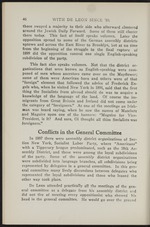 |
“...46 WITH DE LEON SINCE 89.
those swayed a majority to their side who afterward clustered
around the Jewish Daily Forward. Some of them still cluster
there today. This fact of itself speaks volumes. Later the
opposition spread to some of the German assembly districts
Uptown and across the East River to Brooklyn, but at no time
from the beginning of the struggle to the final rupture of
1899 did the opposition control one single English-speaking
subdivision of the party.
This fact also speaks volumes. Not that the district or-
ganizations that were known as English-speaking were com-
posed of men whose ancestors came over on the Mayflower;
some of them were American born and others were of that
foreign element that followed the advice of Frederick En-
gels who, when he visited New York in 1891, said that the first
thing the Socialists from abroad should do was to acquire a
knowledge of the language of the land. Of course the im-
migrants from Great Britain and Ireland did not come under
the...”
|
|
| 6 |
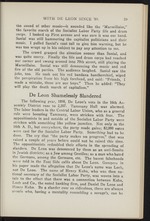 |
“...makes no progress, that was
raised a couple of years before could not be raised this time.
The oppositionists redoubled their efforts in the spreading of
slanders. De Leon was denounced by them as an anti-Semite
m Jewish districts; as a Jew among Gentiles; as a man who hated
the Germans, among the Germans, etc. The basest falsehoods
were told in the East Side cafs aibout De Leon. Gompcrs in
his paper made the allegation that De Leons name was Loeb,
not De Leon. The name of Henry Kuhn, who was then na-
tional secretary of the Socialist Labor Party, was woven into a
tale to the effect that there was a connection between Kuhn,
Loeb and Co., the noted banking firm, and Daniel De Leon and
Henry Kuhn. Be a slander ever so ridiculous, there are always
o-oole who, having a mentality resembling a savages, can be...”
|
|
| 7 |
 |
“...which means when translated into English, lions dale, referred
to him as Comrade Lions Tail, or in German, the language
spoken at the meetings of the 28th Assembly District, as
Genosse Loewenschwantz. This was the horrible language
used by De Leon, and it was quite excusable at that, for there
were a number of men about with similar names, like Loewen-
fuss, etc.
Opposition Organized
With the advent of the year 1899 it became apparent that
the opposition had effected some sort of organization on a na-
tional scale. Connections had evidently been established by
the New York oppositionists with those of other cities. At
any rate the disgruntled elements were getting bolder and more
and more boisterous and bothersome generally. Instead of de-
voting the time to agitation work, party meetings were dragged
out for hours with wrangling; the energies even of the loyal
members were exhausted with endless discussions upon party
tactics. It was felt that a storm was gathering that had to
break, soon...”
|
|
| 8 |
 |
“...many who up to that time had stood by the
party now swung around; the taxation question and De Leons
position regarding the same was top many for them.
Now that the ice was broken, the whole position of the
Socialist Labor Party was wrong; the party had to be remodel-
ed, and De Leon and De Leonism abolished forevermore.
How was this noble aim to be consummated? Oh, that was
easy. Simply get the majority of delegates to the general com-
mittee, then elect all officers of the Section, suspend the Na-
tional Executive Committee, and the Volkszeitungs new exec-
utive committee would do the rest. In other words, repeat the
coup detat of 1889. This time, however, things went dif-
ferently.
De Leon the Storm-Center
The lines were now drawn between the loyal party mem-
bers, who were in favor of the revolutionary stand the Social-
ist Labor Party had taken, and the oppositionists of all shades.
There were indeed many shades to the opposition faction.
Some of them claimed that the attitude of the...”
|
|
| 9 |
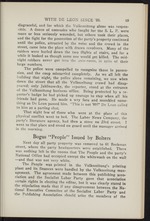 |
“...nothing left in the rooms that The People and the partys
National Office had occupied except the whitewash on the wall
and that was not very white.
The People w?s printed in the Volkszeitungs printing
plant and its finances were handled by the Volkszeitung man-
agement. The agreement made between this publishing asso-
ciation and the Socialist Labor Party gave that association
certain rights in electing the editor, but it was clearly stated in
the sti^lation made that if any disagreement between the Na-
tional Executive Commitee of the Socialist Labor Party and
the Publishing Association should arise the members of the...”
|
|
| 10 |
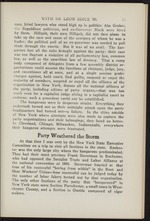 |
“...where attempts were also made to capture the
party organizations and their belongings, they fared no better.
In Cleveland, Chicago, Milwaukee, Indianapolis, everywhere
their kangaroo attempts were frustrated.
Party Weathered the Storm
At that time I was sent by the New York State Executive
Committee on a trip to visit all Sections in the state. Roches-
kangaroos predominated.
They had their most precious Frank Sieverman in Rochester,
who had opposed the Socialist Trade and Labor Alliance at
he na lonal convention of 1896. Sieverman boasted at that
w ? "konnsr from within in the Boot and
Shoe Workers Unionhow successful can be judged today by
e number of labor fakers turned out by that organization.
The only other Sections of the party that kangarooed in
New York state were Section Portchester, a small-town in West-
cheHer County, and a Section in Oneida composed of cigar...”
|
|
| 11 |
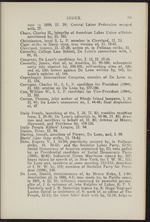 |
“...99-100; subsequent
sorry role enacted by, 100-101; self-seeking aims of, 126;
end of, 130; letters against De Leon written by, 143; De
Leons opinion of, 144.
Copenhagen International Congress, enemies of De Leon at,
II. 156.
Corregan, Charles H., S. L. P. candidate for President (1904),
II. 103; oration on De Leon by, 177-186.
Cox, William W., S. L. P. candidate for Vice-President (1904),
II. 103.
Curran, Thomas, joint author of Rhode Island lampoon, 1. 35,
II. 93; De Leons comments on, I. 44-46; final disposition
of, 47.
Daily People, launching of the, I. 26, II. 82; troubles resulting
from, I. 29-30; De Leons editorials in, 95-96, II. 83; devo-
tion and sacrifices in behalf of, II. 85; defense of Moyer,
Haywood, and Pettibone by, 119-120.
Daily People Killers League, II. 94.
Damm, Peter, II. 94.
Darling, Joseph, anecdote of Flower, De Leon, and, I. 98.
Davis cigar shop strike, II. 78-82.
Debs, Eugene V., I. 53-54; popularity secured by, in Pullman
strike, II. 50-52; and the Socialist Labor...”
|
|
